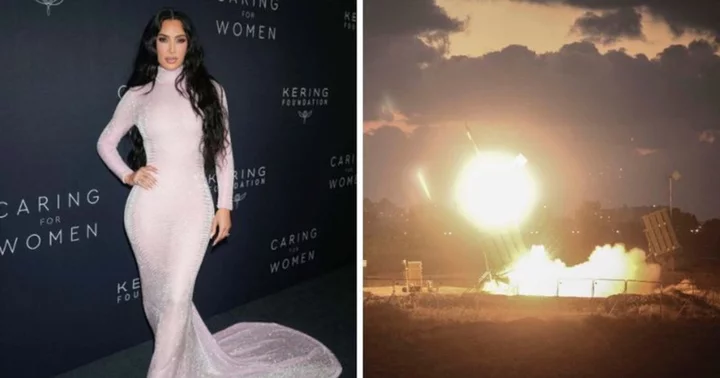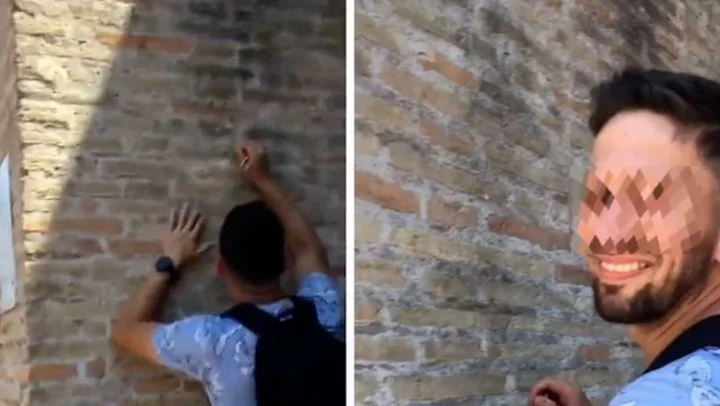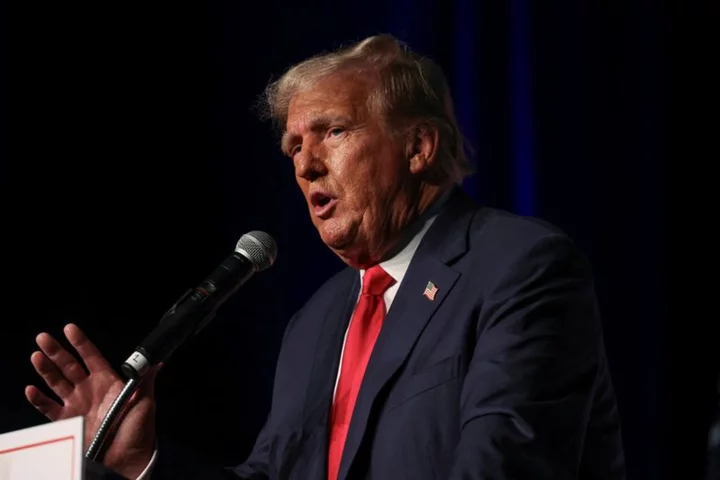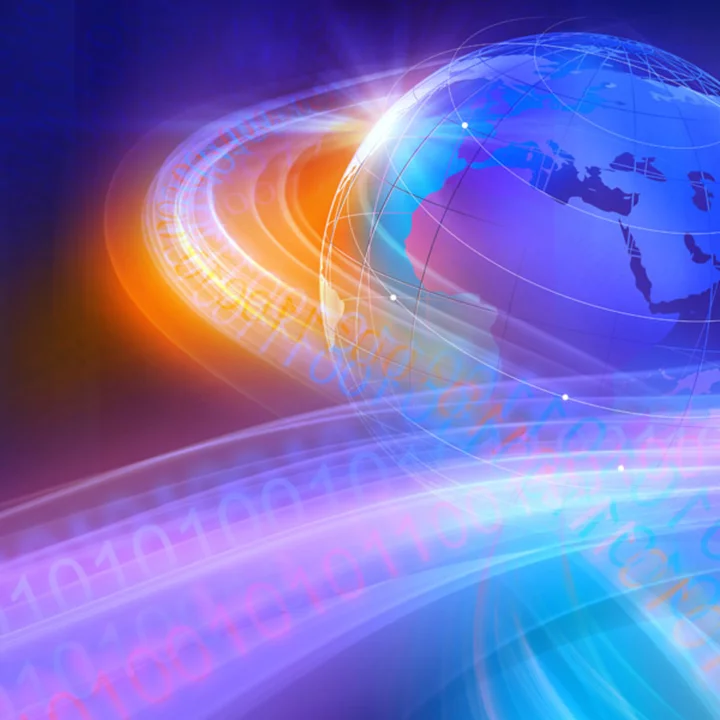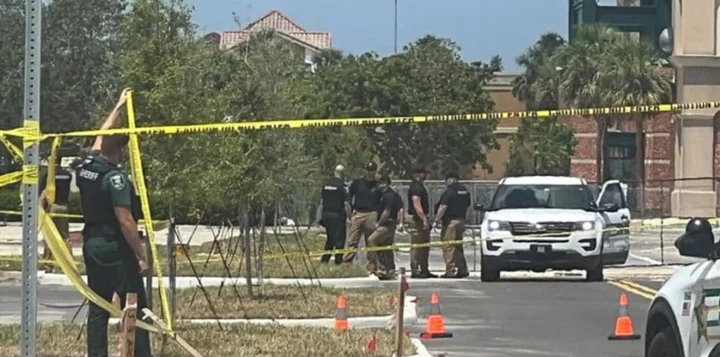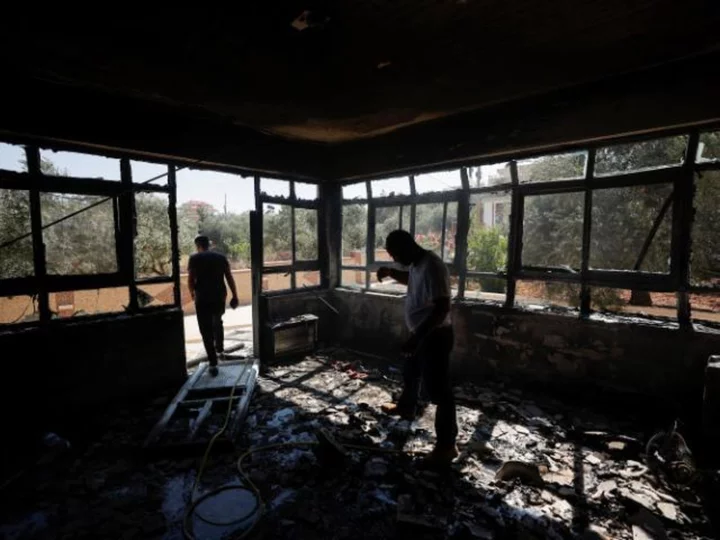Warning: Graphic content, readers’ discretion advised
LOS ANGELES, CALIFORNIA: Kim Kardashian took to Instagram to break her silence on the Israel-Hamas war and compared the situation to the Armenian genocide. She was referring to the approximately one million Armenians who died during the First World War after being sent on "death marches" into the Syrian Desert in 1915 and 1916 by Ottoman authorities.
In her lengthy statement about the situation, the SKIMS founder demanded compassion for the "innocent victims" of the Israel-Palestinian war.
Kardashian, who has Armenian heritage, also mentioned that she is "particularly sensitive to these issues" because she has been "talking about the Armenian genocide for years."
With Hamas' attack on Israel and the latter's air strikes on Hamas-ruled Gaza, the death toll on both sides have surpassed 1000, CBS News reported.
The controversy over the phrase 'Armenian genocide'
The phrase "Armenian genocide" refers to the "campaign of deportation and mass killing conducted against the Armenian subjects of the Ottoman Empire by the Young Turk government during World War I (1914–18)," according to Britannica.
Armenians charge that the campaign was a deliberate attempt to destroy the Armenian people and, thus, an act of genocide. The Turkish government has resisted calls to recognize it as such, contending that, although atrocities took place, there was no official policy of extermination implemented against the Armenian people as a group.
What happened during the 'Armenian genocide'?
According to Fuar Dundar's 2011 'A Question of Genocide: Armenians and Turks at the End of the Ottoman Empire,' mass deportations of Armenians was proposed in February 1915 by Djemal Pasha, the commander of the Fourth Army.
It mostly targeted Armenians in Cilicia, who were relocated in the area around Konya in central Anatolia.
On April 24, 1915, the Ottoman authorities arrested and deported hundreds of Armenian intellectuals and leaders from Constantinople.
As per the studies of Hans-Luker Kieser in 'Talaat Pasha: Father of Modern Turkey, Architect of Genocide' (2018), Raymond Kevorkian in 'American Genocide: A Complete History' (2011), and Ronald Grigor Suny in '"They Can Live in the Desert but Nowhere Else": A History of the Armenian Genocide' (2015), Talaat Pasha, the chairman of the Union and Progress Party, ordered the deportation to eliminate the Armenian leadership and to end the possibility of anyone capable of organizing resistance.
The move eventually resulted in the murder of most of the arrested Armenians. Talaat banned all Armenian political organizations that same day, Suny wrote in his 2015 book.
He also ordered to remove the Armenians who had previously been deported from Cilicia to central Anatolia, where they would likely survived, to be deported again to the Syrian Desert, wrote Suny in his book as well as Taner Ackam in 'The Young Turks' Crime against Humanity: The Armenian Genocide and Ethnic Cleansing in the Ottoman Empire' (2012).
At Talaat's orders an estimated 800,000 to 1.2 million Armenians were sent on "death marches" to the Syrian Desert in 1915 and 1916. The men were reportedly separated from the rest of the deportees during the first few days and executed.
Few men resisted believing it would put their families in greater danger, Hilmar Keiser noted in "Genocide at the Twilight of the Ottoman Empire" for 'The Oxford Handbook of Genocide Studies,' in 2010.
Keiser also said that at times, the convoys would stop at a nearby transit camp and the escorts would demand a ransom from the Armenians. Those who were unable to pay were reportedly murdered.
As per Nazan Maksudyan in his 2020 study 'The Orphan Nation: Gendered Humanitarianism for Armenian Survivor Children in Istanbul, 1919–1922', boys just above the age of 12 were considered to be adult men.
Raymond Kevorkian in 'Earth, Water, Fire: or How to Make the Armenian Corpses Disappear' (2014), noted that thousands of Armenians were killed near Lake Hazar after paramilitaries pushed them off the cliffs.
He also said that several others were held in tributary valleys of the Tigris, Euphrates or Murat to be systematically executed by the Special Organization.
In his study, Kevorkian also mentioned that Armenian men were often drowned by being tied together back-to-back and being thrown in the water. This method was reportedly not used on the women.
Kevorkian also said that while women and children, who made up the a significant majority of the deportees, were not executed immediately, they were subjected to harsh marches through mountain terrains without food and water.
Those who failed to keep up were left to die or shot dead. Some deportees were even forced to walk as far as 1,000 kilometers in the summer heat in 1915, according to Ugur Umit Ungor in 'The Armenian Genocide 1915.'
Kevorkian in 'American Genocide: A Complete History' (2011), noted that the convoys from eastern Anatolia, were eliminated almost in their entirety, while those from farther west, made up the majority of those who survived to reach Syria.
Meanwhile, Ungor claimed that around 99 percent of Armenians deported from Erzerum did not reach their destination.
As part of the genocide, approximately 100,000 to 200,000 Armenians were Islamized, Ackam wrote in his aforementioned 2012 book.
Ackam also claimed that Armenian women were commonly subjected to rape, sexual abuse and prostitution. The only alternative to sexual violence was reportedly suicide, Kaiser noted in his 2010 book.
Keith David Watenpaugh in '"Are There Any Children for Sale?": Genocide and the Transfer of Armenian Children' (2013) revealed that most Armenian children who survived the genocide faced exploitation, including hard labor without pay, forced conversion to Islam, as well as physical and sexual abuse.
While some children were forcibly seized, others were sold or given up by their parents to save their lives, both Ackam and Watenpaugh noted in their respective works.
As per Wikipedia, the genocide ended more than two thousand years of Armenian civilization in eastern Anatolia.
While the Turkish government believed that the Armenian deportation was a necessary and legitimate action that cannot be described as genocide, at least 34 countries across the world have recognized the events as genocide in accordance to academic consensus, as of 2023.
What did Kim Kardashian say about Israel-Hamas war?
Kardashian began her statement on the ongoing Israel-Hamas war saying, "A message to my Jewish friends and family. I love you. I support you. I have heard about how scared you feel during this time and I want you to know you are not alone in this."
"My heart is broken seeing the videos of these babies and family being terrorized and murdered in front of the whole world!" she added.
"As human beings with a heart, how can anyone not be devastated by these horrific images that we will never be able to unsee? Brutal terrorism has taken innocent lives and now both Israeli and Palestinian civilians are suffering and paying the greatest price there is," the reality star continued.
"As an Armenian, I am particularly sensitive to these issues because I have been talking about the Armenian genocide for years, and now after months of blockade with minimal media coverage and no external support, Armenians are the victims of an ethnic cleansing themselves in Artsakh," Kardashian said in reference to the Armenian genocide.
"They are in this moment also suffering from an extreme humanitarian crisis and there are still prisoners of war being held captive or missing," she stated.
"No matter whose side you are on, or how you have been triggered by the horrors of these past few days, our hearts should always have room for compassion towards innocent victims caught in the crosshairs of warring over power, politics, religion, race and ethnicity," Kardashian pleaded.
"Although I know there is nothing I can do to personally get rid of the pain of those who are suffering, my family and I are praying for the safe return of hostages, for those that have died and their affected families, for peace for all the innocent and for the perpetrators of this indefensible violence to be brought to justice," she mentioned.
"My call to action today, something that we can all do, is simply to reach out to your friends, colleagues and those in your community, those who are hurting, no matter what side they are on, check in on them and tell them you love them," the SKIMS founder wrote.
"I also ask that, during difficult times like these, not to judge who is or isn't speaking out, because everyone should be allowed to deal with times of crisis in the way that they feel most comfortable whether it is privately or publicly," she advised.
"Prayers and peace always," Kardashian concluded.

